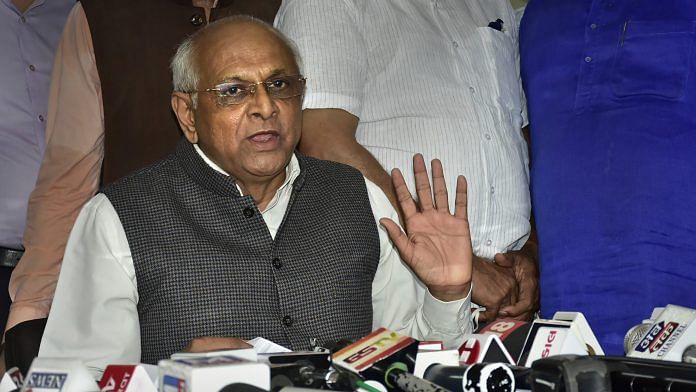New Delhi: The Gujarat government is bringing out 75 books this year on the state’s “unsung heroes”, of which 25 will be released by Chief Minister Bhupendra Patel and Governor Acharya Devvrat on 1 May, when the state celebrates its foundation day or the anniversary of the erstwhile Bombay State’s 1960 bifurcation into Gujarat and Maharashtra.
The release coincides with 75 years of India’s Independence, and comes ahead of assembly elections in the state later this year. Gujarat is currently led by the BJP.
Vishnu Pandya, Chairman of the Gujarat Sahitya Academy, which is publishing the books, told ThePrint that they have “been working for long to bring out biographical books on unsung heroes, many of whom are social reformers and some led the struggle for freedom”.
“The first 25 books will be released on 1 May while the rest will be released in the next two-three months,” he added. “The new generation has very little knowledge about these heroes, so it’s our duty to pass on the historical importance of these heroes.”
Some of these “unsung heroes” include social reformer Motilal Tejawat, freedom fighter Shyamji Krishna Varma, Mahatma Gandhi’s nephew and journalist Samaldas Gandhi, who was instrumental in Junagarh’s accession to India, social reformer Thakkar Bapa, Govind Guru, who popularised the Bhagat movement, and the 15th-century poet-saint Narsinh Mehta, who was the writer of Vaishnava Jana Toh, among others.
The Modi government has long been working to give national prominence and a place in history books to the country’s “unsung heroes”.
Political experts have called the Gujarat book project an “attempt to appropriate Gujarati society leaders” who led the struggle for rights of tribals and Patidars before 1857, and who later worked towards social awakening for the freedom struggle against the British.
One such commentator, who did not wish to be named, said: “It’s an RSS-BJP project to appropriate leaders to derive electoral benefit, since Gujarat has long been the laboratory of Hindutva. Writing and talking about these heroes will add to the BJP’s nationalism vote-bank, as many of them are from the tribal and Patidar community.”
“In an election year, these small steps will work to polarise castes,” the commentator added.
Arun Vaghela, a professor of history at Gujarat University who has worked on tribal heroes, told ThePrint: “Such projects help in social awakening as history and politics are intertwined.”
Also read: Eye on Gujarat polls? Modi govt shelves Par-Tapi-Narmada river-linking amid tribal protests
Pet project
The RSS has in the past stated its intent to revisit Indian history and begin a debate on what has been written so far. Many “unsung heroes” are part of this project, and are finding space in books and documentaries for educational, cultural and political purposes.
In Gujarat, the BJP has worked to popularise local leaders and heroes, and its efforts have picked up pace of late.
This January, on Republic Day, the Gujarat tableau was themed on ‘Tribal Revolutionaries of Gujarat’. Key in the tableau was the Eki Movement hero Motilal Tejawat, who organised tribals against paying tax to the British.
When Modi was the CM, a memorial to Tejawat was built at a site in north Gujarat’s Bhil village where 1,200 adivasis were reportedly shot dead by the British on 7 March 1922, in what was called the “Jallianwala Bagh” of Gujarat.
Hansmukh Joshi of the Gujarat Itihas Sankalan Samiti said: “We have organised various programmes in the last one year to rock public memory about our great unsung heroes. We organised 30 events in state universities to remember their contribution.”
Doordarshan recently aired a short clip on Manibhai Desai, Mahatma Gandhi’s associate who established a nature therapy ashram in Urali, Pune, where Gandhi spent many days during 1946. Desai was awarded the Padma Shri in 1968 and Ramon Magsaysay Award in 1982.
On 30 March this year, Modi paid tribute to Gujarati hero Shyamji Krishna Varma — who founded the Indian Home Rule Society, India House and the Indian Sociologist in London — on his death anniversary. He also reminisced about the time he brought back Varma’s ashes from Geneva in 2003 when he was CM of Gujarat.
In 2003-2004, the Gujarat government established the Krantiguru Shyamji Krishna Varma Kachchh University.
A professor from Bhakta Kavi Narsinh Mehta University is writing five books on religious leaders who were involved in social reforms and associated with Junagarh’s accession to India.
Contributions of Gujaratis
Narsinh Mehta, who was known as a devotee of Krishna and penned more than 750 poems, was born in a Brahmin family but was believed to have been thrown out of his community for associating with the Dalits. In 2015, the Gujarat government established a university named after him and a light-and-sound show was started in his name in Junagarh.
Two lesser known heroes from the state’s Dwarka region are Jodha Manak and Mulu Manak who revolted against the British forces in 1857.
Govind Guru was a social and religious reformer in the adivasi-dominated border areas of Gujarat. He encouraged the Bhil tribals to reject bonded labour and fight for their rights.
Samaldas started the Gujarati daily Vande Mataram. When the Nawab of Junagadh acceded his state to Pakistan in 1947, Samaldas headed a government-in-exile, Aarzi Hakumat, created by the citizens of Junagadh. The provisional government captured 160 villages in 40 days. Junagarh acceded to India in November 1947, and the move was formalised by plebiscite in 1948.
On the “unsung heroes”, Professor Vaghela noted that “very few people know about women who taught Mahatma Gandhi’s wife Kasturba to write and read”.
“When the tribal policy of India was decided by Gujarat, many tribal areas were developed and have become tourism spots due to the political and social importance of these heroes,” he said.
The copy has been updated with changes in Professor Arun Vaghela’s quote.
(Edited by Nida Fatima Siddiqui)
Also read: From Umiya Temple to Hanuman statue, Modi is ramping up devotional outreach in Gujarat



